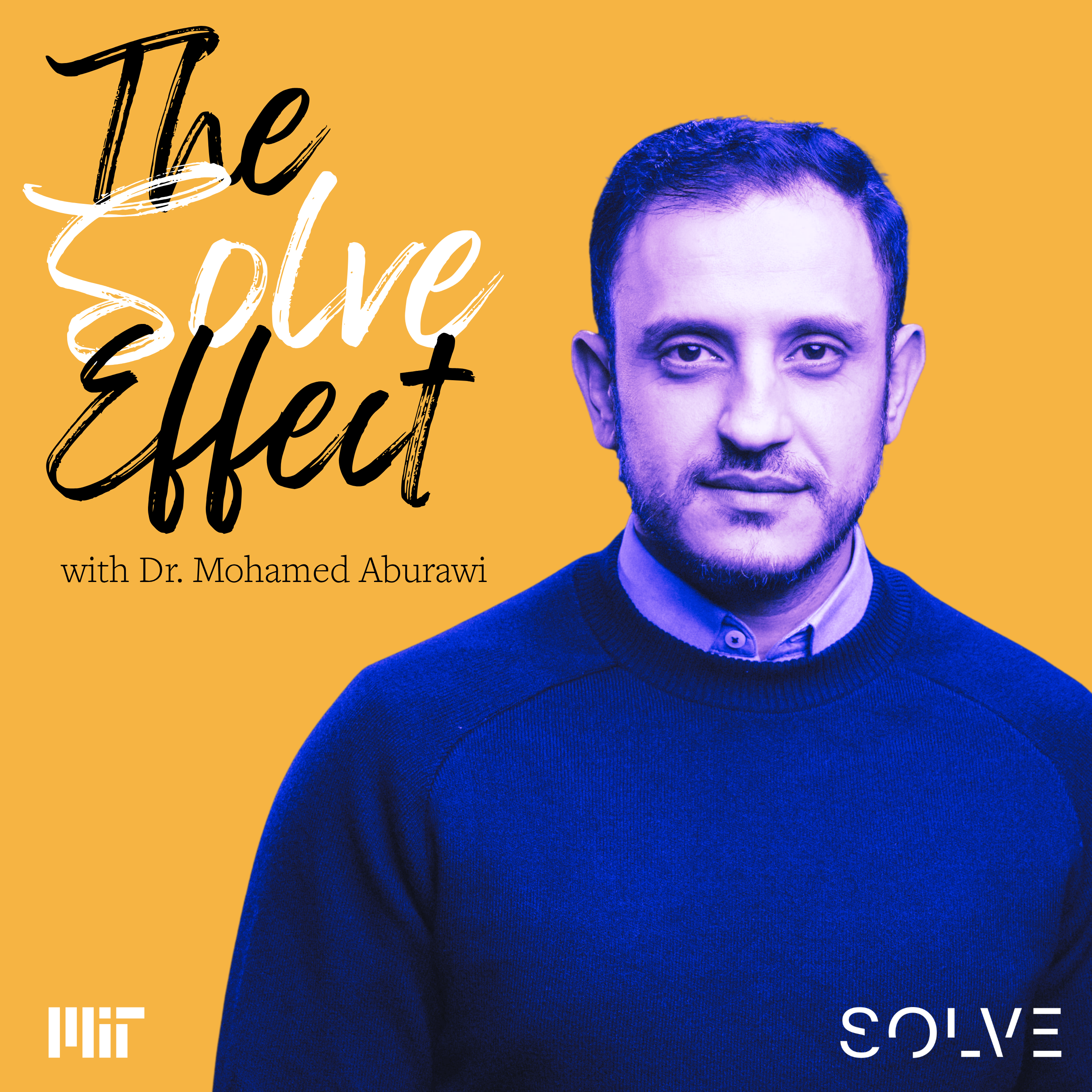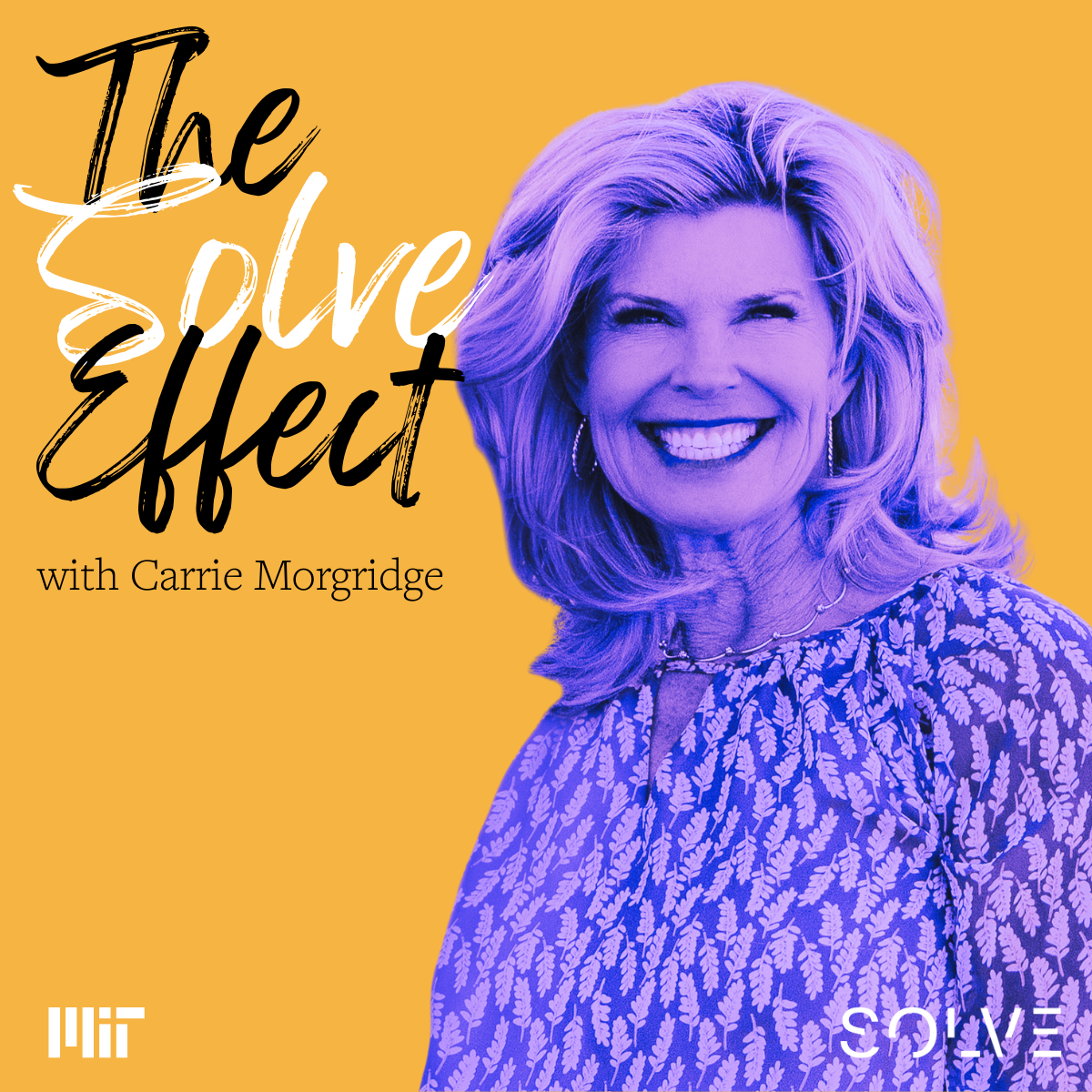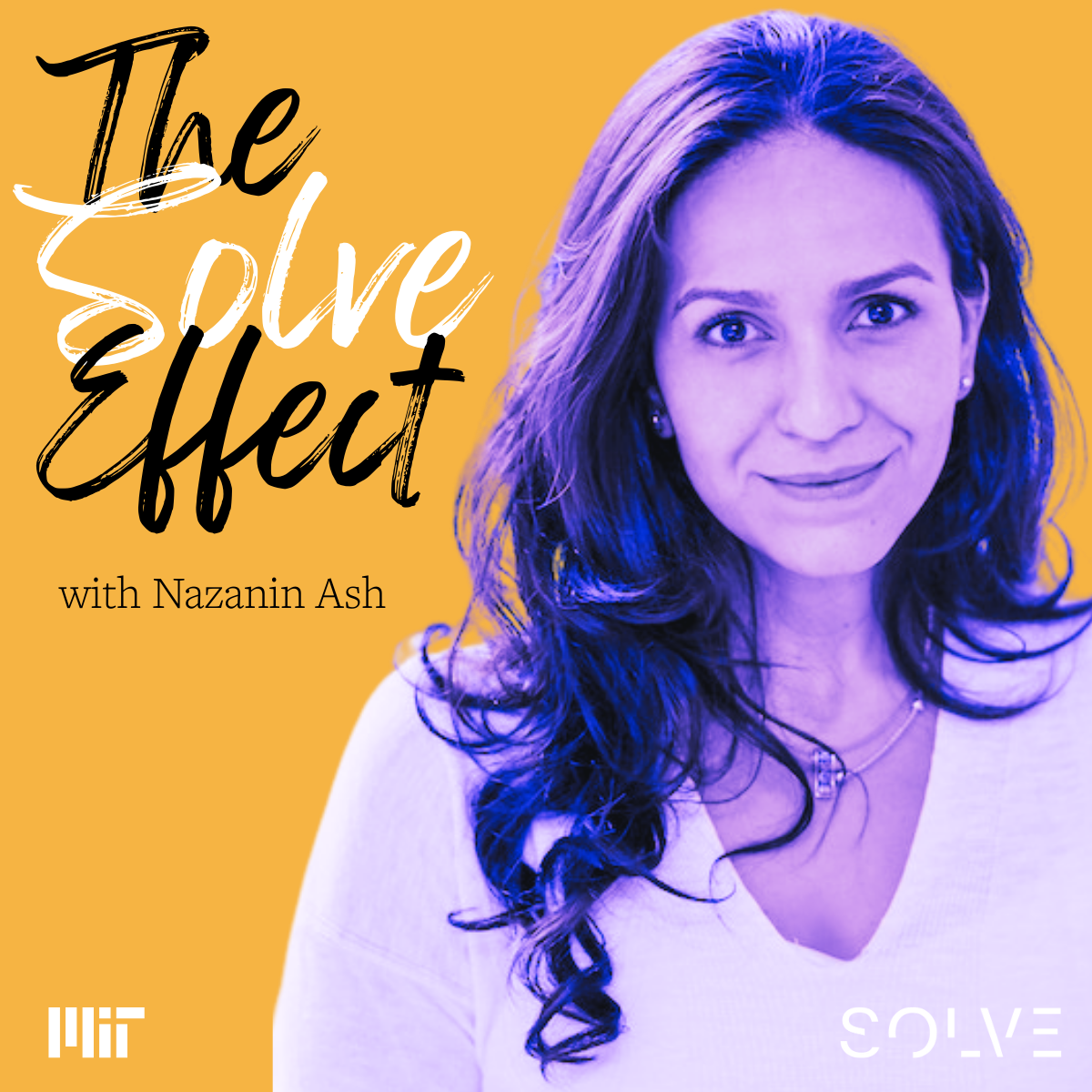
A Visionary Healthcare Innovator: Dr. Mohamed Aburawi on Tech, Healthcare, and Impact Investing
This is a transcript of Episode Five of The Solve Effect, edited and condensed for clarity. Listen on Spotify, Apple Podcasts, Amazon Music, or iHeart Radio.
Hala Hanna
Welcome to The Solve Effect, where we spotlight extraordinary people tackling the world's toughest challenges with bold, innovative solutions. I'm your host, Hala Hanna.
So most entrepreneurs build for abundance. Mohamed Aburawi builds in scarcity.
When civil war shuttered a quarter of Libya's healthcare facilities and left 3 million people without medical access, this Harvard-trained surgeon could not just stand by. So he launched Speetar, which literally means “hospital” in Libyan Arabic, and it's become a comprehensive telehealth platform. That's how we got to meet Mohamed at Solve. He became a Solver in our Global Health Equity Challenge, and during COVID, Libya's Ministry of Health adopted Speetar as their primary pandemic response. Today, Speetar has evolved from a hospital in the cloud to a full healthcare ecosystem that has taken Mohamed to Forbes, TED, World Economic Forum, Echoing Green, and many more places.
But Mohamed is not stopping at Speetar in Libya. He is now the founder and CEO of Atarona Ventures. He's building many other transformational solutions that tackle the holistic equation of education, financial inclusion, and access.
Mohamed brings to life what I call the adversity advantage: this counterintuitive idea that building in crisis can create more resilient solutions than building in comfort. He's one of the Solvers who proves the most innovative solutions do not have to come from Silicon Valley's abundance, but also from places where failure isn't an option because lives literally depend on it. Mohamed, welcome to the Solve Effect.
Let's start with that decision that changed everything. You are at Harvard Medical School, and then what happened? Walk me through that moment, and what was the conversation in your head?
Mohamed Aburawi
Over a decade ago, I arrived in the United States for the first time, straight from war-torn Libya. I had been selected for a prestigious research fellowship at Massachusetts General Hospital in the Department of Surgery at Harvard Medical School.
And I didn't bring much with me, just a suitcase, a few books, and the weight of dreams carried across continents. But there was one thing I made absolutely sure to pack back then was my travel-sized iron. Getting in the US as a young Libyan man named Mohamed in those days, it meant secondary security screening. But I remember as the officer went through my bag and spotted that little iron, he cracked a smile. I think he thought at that moment, he realized this guy isn't a threat, it's just a medical nerd who...cared enough to haul an iron across the Atlantic.
HH
Tell me, what's the iron for?
MA
Where I come from, a crisp white coat is a mark of a good doctor. So that night before my first day at the hospital, still jet lagged, I remember having landed just a few hours earlier, I stayed up carefully, ironed my white coat. No creases, no wrinkles, just me, my coat, and that quiet determination to make a first good impression.
And the following morning, 4:30 AM before the sun had risen, I rushed to MGH across the Boston Commons, and walking to MGH, the top-ranked hospital in the United States, I was really nervous. But I felt I was ready. That morning when I sat for my very first grand rounds, the senior fellow was presenting the case of a 60-year-old man who had recently undergone a cutting-edge dual transplant: a kidney and a pancreas. The surgery was groundbreaking and textbook. He had diabetes-induced kidney failure, and now, with these new organs, he basically had a second chance at life.
And yet the patient wasn't really recovering as expected, so they brought in everyone. Nephrologists, endocrinologists, pharmacologists, nutritionists, a full multidisciplinary team and experts at the top of their field. And after detailed discussion, the team reached a conclusion: they had done everything possible. He was receiving basically the most advanced treatments that science had to offer. And that was all they could do now.
And that moment shook me, because where I came from, the conclusion is almost never that everything possible has been done, right? There is always something missing: a medication out of stock, a broken machine, a specialist who isn't in the room because they simply didn't exist in the country. And often that missing piece could be the difference between life and death. For me, that was the moment I understood the true power and responsibility of innovation, not just to push the boundaries of science and technology, but to close the gaps that leave entire populations behind. For me, that moment was the driving force behind what came to be Speetar.
HH
It really brings to life what the challenge at hand is. And so when you decide to do something about it, to take that innovation that you were seeing in action and apply it to your home country. . . how do you go about building a tech platform in a country where the infrastructure fails you, electricity goes out, et cetera? Where did you start?
MA
That realization became the compass for my life's work. Medicine wasn't just about skill or knowledge. In too many places, such as Libya, the systems far too often are failing. And that's why we built Speetar, to be a hospital in the cloud, bringing in diaspora physicians and communities, and of physicians who fled their countries, essentially reversing the brain drain.
For me, it was another way of practicing medicine, not by seeing one patient at a time, but by being able to serve thousands every hour. That feeling that you could multiply impact was very addictive. It was eventually what led me down the line to put away my white coat and scrubs because I realized the larger surgery that I could perform was redesigning the operating system of healthcare itself.
This is the thing: the deeper I went, the more I learned that challenges don't live in silos. You cannot solve health without solving education. And you cannot solve education without reliable energy. And none of it is sustainable without inclusive finance. So the biggest challenge wasn't really discovering solutions, I would say. The solutions were already there. All these solutions existed, but weren't reaching the people who need them most. So for us, innovation is in the business model and in the way that you distribute. Because I don't think we have a crisis of innovation. We have a crisis of distribution.
HH
You chose to build Speetar as a hybrid of a for-profit and a non-profit. You raised seed funding for it. How do you come about the decision of building something for profit in a very under-resourced environment?
MA
Yeah, that was a tricky decision in the beginning because many times we had some of that pushback, like, it would be easier if we structured this as an NGO. It will unlock more grants, more funding. But for me, I think it was always about sustainability and how can this really sustain but also scale. So if we had not figured out an engine where we can make those who can pay for the service pay for it and those who can't not having to do so because there is this kind of cross-financing vehicle, I felt that would be a failure, because it was just going to be putting life support on something that people will be depending on. And as we see now when aid is cut or financing is scarce, that would ultimately go. In the long run that has proven to be the right decision. With Speetar, we were able to reach more than 3 million patients across five countries in record time. And that was, for us, proof that even in fragile systems, you could leapfrog into the future if given the right tools.
HH
This global development script that we've all been working with is that the global majority faces a crisis and then there's all this aid that flows from the West to respond. And today with that funding drying up with it is the illusion that this model was ever sustainable. The most successful Solvers and the ones that survive the longest are the ones who create that kind of financial stability. Knowing that your patients rely on you so much, what a tragedy it would be for something like Speetar to disappear because the funding dried up.
MA
Yeah, and I think what you quickly learn is that scaling trust mattered as much as scaling technology. And in what we like to call growth markets, people don't just buy products, they buy the belief that you'll still be there when things get hard. And that's why we launched Atarona Ventures, which in Arabic means, “our impact.” We took the venture studio model and provided the needed early funds, and began applying the lessons from Speetar to other system-critical domains. And today, Atarona supports over a dozen ventures spanning health, education, climate, and inclusive finance.
How can others follow suit? I would like to say by committing to long-term horizon bets, where others only see volatility, by building with and for communities, not just around them. And to be honest, by recognizing that growth markets are not a charity case. They are the largest untapped business opportunity of our time.
HH
Help me understand the Atarona thesis.
MA
Well, this is how I see it, or the trends I see emerging. The next great wave of innovation will be defined by its ability to bridge abundance with access. We already have the cures, the technologies, the blueprints. The real question is, will we deliver them equitably?
And one trend I see is the democratization of capital through, for example, one of our ventures, Jisr, which means, “bridge” in Arabic, we are enabling everyday people, retail investors from Boston to Benghazi, to become micro-investors in impact-driven startups. Because we believe when financing becomes participatory, solutions become unstoppable.
Another trend is the rise of AI as an equalizer. And here I'm not talking about the headline-grabbing large language models alone, but small context-aware models trained on invisible datasets. And we did that with Speetar: with rural healthcare records, local languages, informal transactions. That's where AI will matter the most, I believe. And not in replacing humans, but in amplifying humanity, where resources are scarce.
The future will not only be divided between developed and developing, it will be shaped by those who bet on growth when it was least obvious, right? And I think that's what we're trying to do with Atarona Ventures. And by supporting all these entrepreneurs and working with them and solving these intractable challenges in some of the most impoverished areas, we're not doing this out of charity. And that's kind of, I would say, the thesis.
HH
I want to unpack three paradigm shifts that you mentioned.
So the first one is about AI as an equalizer. Will it make us leapfrog or will it actually accelerate the AI divide.
I want to talk about the invisible data sets that is very linked to AI being an equalizer or not. And what that means, I've heard you talk about data being the new oil.
And then the third thing is this idea that you're implementing with Jisr, that you're turning every person in the diaspora into an investor and a philanthropist. Indeed, the biggest philanthropy in the world is actually remittances, right, that we all send back home. So you're activating that immense capital for good and channeling it to the right places.
MA
Our core belief is the three C's philosophy, connection, creation, and capital, right? We believe that these three, almost like an Ikegami, and we want to exist at this intersection, connecting resources together, creating solutions and making sure that they're well capitalized, and we're really leveraging the capital out there and helping people put their money where their heart is. Many times, the vehicles that exist, and we see through many of the platforms out there and solutions, are just kind of, I would say, donor-driven or this is the mentality of feel-good funding and donation, where it's not really empowering to many of these global entrepreneurs. So we wanted to change that, and that's really some exciting work that's in the making, and we're doing this in partnership with some of our colleagues at MIT.
But let me go back to the data, because I believe data is an incredible resource. And unless we view it as such, especially in areas where data has not been mined yet, it is really going to be transformative. And there is this kind of concept of data exploitation now going around about many companies setting shop in Kenya, Somalia, whatever, and just kind of exporting data and hosting elsewhere. And nobody knows what's going on.
So I think a lot of policymakers and local entrepreneurs and advocates are waking up to that.
When we started, telemedicine was the low-hanging fruit. But when we connected with doctors in diaspora or remotely, what we often came across was a question that many of these doctors did not understand the full context of the patient they're seeing in remote areas, because there were no reliable past records or APIs that we can plug in to give that kind of context. So we essentially knew that the real frontier was the data and we built cloud-based EMR systems that were context-appropriate. And we started aggregating and helping a lot of these patients collect all their past files, lab results, prescriptions, collect their vitals, and then create that kind of baseline.
So the context is very important, especially as we look into the future with the majority of the global population being in these regions. Yet the models that are currently being trained and exported are not reflective and not taking into consideration that data.
One of the exciting projects that we're working on is Jisr. It's this platform where we're connecting, as I mentioned, retail investors across the globe with entrepreneurs that are doing the hard work and unlocking these hidden assets.
And it's not charity-based, right? It's basically someone really passionate about climate or women's health or agritech and wanting to invest in entrepreneurs doing that work in Kenya or Malawi or South Africa or Libya and lacking that means and lacking that visibility. We’re working on that. And there's a lot of questions and challenges we had to address around like legality, logistics, transparency, the technology, impact measurement.
When you look at the numbers, impact investing now exceeds $1.2 trillion in assets under management. And some of the recent data shows that 71% of millennials prioritize investment with social and environmental impact. The annual growth rates and impact investing exceed 20%, signaling rapid expansion in the space. And if we would like to use the term crowdfunding, that market is valued at $72 billion, I believe, and then growing at 16% CAGR.
So there's a lot of potential here. Democratizing private market investment is a real opportunity that is not being leveraged to its full potential.
I'm really envisioning a future where I can invest in all the Solvers out there, the incredible entrepreneurs that are doing great work across the globe and doing that with ease and access.
Because again, there's a difference between investment and donation, right? When I invest in that, there is a sense of empowerment. There is a sense of accountability that I think really goes further as opposed to like just giving grants or donations.
HH
Here's the competitive edge of adversity. We can do hard things for longer than others. I really appreciate your ability to make the invisible visible: invisible data sets, unlocking invisible capital, surfacing ventures worth investing in, and empowering the individual to do so much more than what the current system allows us to do to support each other, really, and to show up for each other.
MA
My real hope is for the future that no child's life's trajectory will ever be determined by their birthplace. And that same ingenuity that gets us to Mars is equally committed to delivering vaccines in some of the most impoverished parts of the planet.
And I believe one thing everyone can do today is to reframe how they see opportunity. To not just ask what problems we have now, but let's ask what problems are we leaving unsolved. And the second question really demands responsibility. For the Solvers out there, I'd say innovation is not just about what we create, it's about what we choose to solve, right?
The companies that will matter most in the future won't just be the ones that have the biggest valuation, but the ones that built trust where trust was scarce and access where access was denied.
That's where I have personally chosen to place my bets. And I believe that's where, honestly, breakthroughs that truly stand the test of time will come from.
HH
Three insights from Mohamed's journey deserve our attention:
First, the crisis is in distribution, not innovation. We already have many of the cures, the technologies, the blueprints. The question is how we deliver them equitably to those who need them most.
Second, data is the new oil, but it has to benefit the communities it comes from. Small, context-aware AI models are where AI becomes an equalizer rather than another tool of extraction. This requires training on datasets that can feel invisible: rural healthcare records, local languages, informal transactions etc.
And third, the diaspora is the world's largest untapped pool of impact capital. When you transform remittances into investment rather than charity, you can unlock not just money, but also accountability, empowerment, and long-term sustainability.
Mohamed is betting on growth where others only see volatility, and untapped business opportunity where others see charity.
His parting wisdom cuts to the core: innovation is about what we choose to solve. That formulation demands we take responsibility for our choices.
I’m Hala Hanna, thank you for tuning into The Solve Effect.
Tags:
- Health
- Podcast
- Innovation
Related articles
-
A Transformative Philanthropist: Carrie Morgridge on Joyful Giving, Courage Money, and Family Foundations
What does joyful and courageous giving look like in practice? Carrie Morgridge, Co-Founder and CEO of the Morgridge Family Foundation, has a few ideas.
-
Did AI Get It Right?
Reviewing screening outcomes for the 2025 Global Challenges
-
A Social Impact Visionary: Nazanin Ash on Welcome.US, Collective Power, and Mutual Flourishing
In this episode of The Solve Effect, we sit down with Nazanin Ash, CEO of Welcome.US, to explore how millions of Americans are reshaping what safe, legal immigration can look like—one act of welcome at a time.